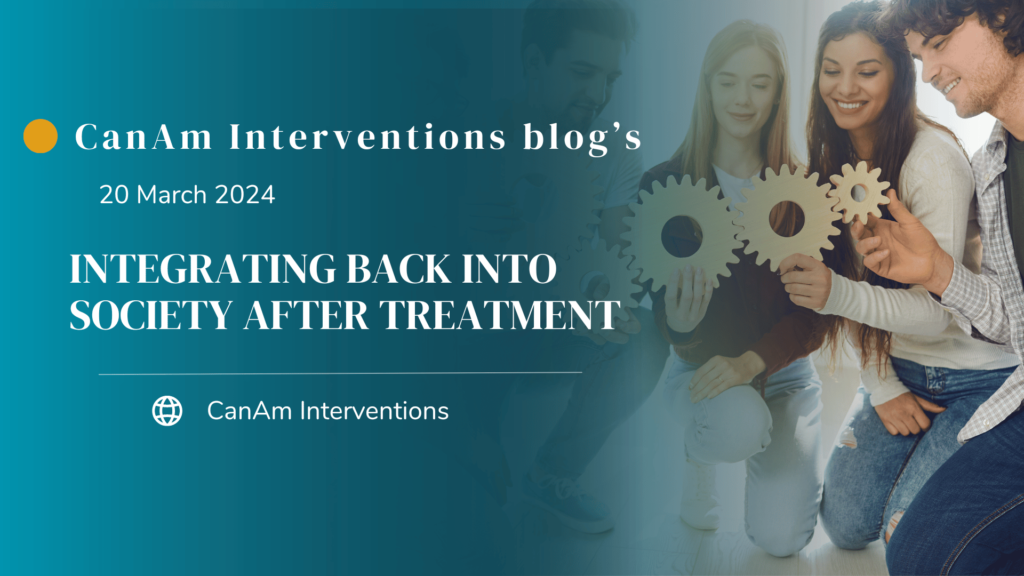Completing a drug treatment program is a great accomplishment and a wonderful feeling. However, transitioning to normal life after treatment has a tendency to leave people feeling a bit anxious and full of questions about what comes next.While in rehab, daily life is very planned and structured, giving the person in treatment fewer options to deviate from their schedule. This is done to restore a semblance of normalcy back into their lives after living in addiction, which is usually riddled with chaos.Naturally, integrating back into a life without this sort of structure can seem scary and overwhelming. So, it is critical that a winning strategy is in place to maintain sobriety after rehab. Can-Am Interventions would like to bring awareness to life after treatment and to provide some tips on how to manage this new transition.

Planning For life after treatment,during treatment
Studies have estimated 23.5 million Americans aged 12 years or older need treatment for drug abuse each year of which only about 11 percent seek treatment. This means that almost 2.6 million Americans each year undergo treatment for drug addiction and in turn have to reintegrate back into their lives.An all-inclusive plan and aftercare program are crucial parts of long-term recovery for anyone who has completed an addiction treatment program. Keep in mind that the treatment program is only the beginning and is simply the foundation for recovery.Living life sober is a daily commitment to seeing your program through each and every day. It’s not over just because an inpatient residence has been completed.Long-term recovery requires a mindset that understands the daily work that goes into sustaining what was learned in the program.Addiction treatment programs should prepare you ahead of time for what the transition may look and feel like by warning and educating around what to expect and how to make healthy decisions outside of the confines of its safe walls.Often, it’s also a good idea to get family and friends involved before transitioning out of rehab so they can serve as a guide for you as well as offer encouragement by also knowing how to handle the new you.
Helpful tips to avoid relapse In early addiction recovery
Managing triggers and temptations is the name of the game in sobriety. If you can master your ability to manage triggers and to be aware of what sets you off or tempts you, you will flourish in your sobriety.Being able to tune into yourself now that you have more clarity from your recovery is such a gift. Embrace your ability to avoid relapsing by listening to yourself and following along in what you learned during treatment.Most people who relapse do so because they do not have a plan in place or are not following their plan or their intuition. There are certain things you can do to set yourself up for success in sobriety by avoiding relapsing.
- Stick to a healthy daily routine and schedule so that you lower or eliminate places where triggers can occur.
- Having structure helps to keep things stress-free and straightforward. Keeping stress levels low will help keep away thoughts of dealing with stress by using or drinking.
- Avoid parties for awhile, as they put a user at a much higher risk of relapse. It’s better to not put yourself in situations, especially initially, until you are unyielding in your sobriety and have no desire to drink or use drugs whatsoever before entering into a party scene.
- Understand that some friendships and relationships will need to change or even end. Old friends who are still partying, using and drinking may not be the best influence during such a sensitive transition.
- Don’t go at it alone. Have a support group in place to help you navigate the new waters of living sober. Having a good support system will help you to feel less alone, and it will also help to hold you accountable.
- Stick with a spiritual practice, whatever that may look like for you. Whether it’s prayer,12 step program, church, yoga, meditation, dance or exercise, be sure to keep your body and mind grounded by having a release that helps you surrender each day.
- Allow yourself some time for reflection and processing. Journaling or continuing with counseling or therapy is an excellent way to keep mental clarity throughout the transition process.
- Be aware of warning signs of relapse and pay attention if you feel yourself getting close to any of them. Some relapse symptoms may include: being dishonest, becoming overly tired or stressed, depression, irritability, or being overly confident and stubborn about needing any help.
A treatment program is not a quick fix for getting clean, but it is a step in the right direction for sober living. There are many strategies and ways to get clean and stay sober. Finding a treatment program, aftercare plan and the tools that work best to sustain recovery have proven to work for many people.
Help?
The first step in addictions recovery is admitting you have a problem. After that much help and guidance is required. Can-Am has a vast network of resources of experienced professionals who can provide the treatment that is needed for each individual. We are here to assist at all circumstances of recovery such as the transition back to life from treatment programs. If you have any questions or concerns we welcome you to reach us so we can help.
E: patti.pike@canaminterventions.com
1-800-638-1812 Toll Free Internationally
415-827-3725 Cell /Text
415-578-2875 Office